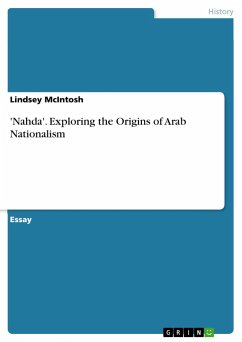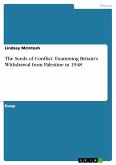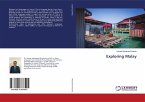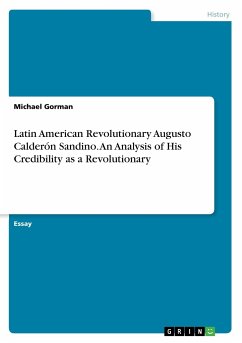Essay from the year 2014 in the subject History - Miscellaneous, grade: 68, University of Strathclyde, course: History, language: English, abstract: Exploring the origins of Arab nationalism is a challenging project. To assess this particular subject is to enter a huge arena of discussion; the multifaceted nature of the word 'nationalism' itself - which as Z. Lockman notes 'always means different things to people in different contexts' - presents difficulties when engaging the subject from a variety of different historical perspectives. The objective of this essay will be to assess several aspects surrounding the genesis of Arab Nationalism in the Middle East from various political, cultural and intellectual dimensions in order to gather a basic understanding as to when and why this movement occurred. Complications emerge in such a study when one considers that the genesis of this movement was by no means a single and stable birth of ideas overnight, but rather a fragmented series of awakenings, occurring across the Arab heartlands at different times and for slightly varying reasons from surrounding neighbours. For example, Egypt presents an interesting case. J. Jankowski notes the nationalist movement of the Egyptians to pre-date collective Arab nationalism by roughly a generation and recognises the Egyptian variant of nationalism to be a distinct and separate phenomenon which gathered strength from the 1870s onward. The area's historical and cultural distinctiveness from that of her neighbours meant she appeared to work against rather than for 'Arab' orientation and instead focused upon her own individual ideals in promoting 'Egypt for the Egyptians.' As separate instances of territorial nationalism such as the case of Egypt illuminate, no definitive answers to the question of what caused nationalism to occur may accurately represent the Arab community as an entirety.However, by assessing general factors which bound the Arab peoples together in spirit as one, this essay will attempt to piece together a basic understanding of what pushed an undercurrent of Arab awareness to the surface in the early decades of the 20th century.
Hinweis: Dieser Artikel kann nur an eine deutsche Lieferadresse ausgeliefert werden.
Hinweis: Dieser Artikel kann nur an eine deutsche Lieferadresse ausgeliefert werden.








